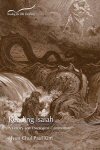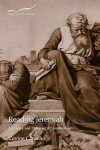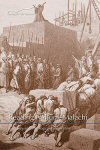Smyth & Helwys Reading the Old Testament Commentary Series Upgrade (3 vols.)
Digital Logos Edition
Overview
It’s easy to get bogged down in the minutiae of word-by-word, verse-by-verse exegesis—picking over familiar passages in such detail can sometimes render them flat and uninspiring. Worse, in the hands of scholars writing for scholars, even the most profound research can become stupefying and impenetrable. This new upgrade to the Reading the Old Testament series helps you rediscover the Hebrew Bible with cutting-edge scholarship—whether you’re a specialist or lay person. Expert authors Hyun Hul Paul Kim, Corrine Carvalho, and Steven Tuell focus on the larger literary and thought units of a given book, highlighting how they function in the work as a whole. Utilizing a broad array of reading strategies and critical approaches, these scholars help you become a more competent, more engaged, and more enthusiastic Bible reader.

Key Features
- Focuses on large literary and thought units in Old Testament books
- Features the scholarship of acclaimed biblical experts
- Helps readers become more competent, engaged, and enthusiastic Bible readers
Product Details
- Title: Smyth & Helwys Reading the Old Testament Commentary Series Upgrade
- Series: Reading the Old Testament Commentary Series
- Publisher: Smyth & Helwys
- Publication Date: 2016
- Volumes: 3
- Pages: 775
- Resource Type: Commentaries
- Topic: Biblical Studies
Individual Titles
- Reading Isaiah: A Literary and Theological Commentary by Hyun Hul Paul Kim
- Reading Jeremiah: A Literary and Theological Commentary by Corrine Carvalho
- Reading Nahum–Malachi: A Literary and Theological Commentary by Steven Tuell

In this commentary, Hyun Chul Paul Kim brings together innovative interpretive approaches and the proposals of various scholars to interpret the book of Isaiah in light of the ancient literature/culture, intertextual allusions/correlations, and socio-historical contexts of the empires. While closely exegeting key issues of each chapter, the commentary also explores interpretive relevance and significance between ancient texts and the modern world. Engaging with theological messages of the book of Isaiah as a unified whole, the commentary will both illuminate and inspire readers to wrestle with its theological implications for today’s church and society.
Hyun Chul Paul Kim presents a compelling commentary on the book of Isaiah, a book that would be considered politically incorrect in our contemporary world. He deftly combines the details of a diachronic, or historical, analysis of the various elements of the book with an overarching synchronic, or literary, perspective that unites the book as a whole. His work is fundamentally intertextual in that it explores the relationships between Isaiah and ancient and contemporary worlds. This accessible commentary will both prompt and enable students to engage this endlessly fascinating book.
—Marvin A. Sweeney, professor of Hebrew Bible, Claremont School of Theology, professor of Tanak, Academy for Jewish Religion California
Hyun Chul Paul Kim is the Harold B. Williams Professor of Hebrew Bible at Methodist Theological School in Ohio. He is the coauthor of You Are My People: An Introduction to Prophetic Literature and coeditor of The Desert Will Bloom: Poetic Visions in Isaiah, Formation and Intertextuality in Isaiah 24–27, and Concerning the Nations: Essays on the Oracles against the Nations in Isaiah, Jeremiah and Ezekiel. A former cochair of the Formation of the Book of Isaiah group at SBL and a recent Fulbright U.S. Scholar to Korea, he is currently a cochair of the Intertextuality and the Hebrew Bible consultation at SBL.

In this new volume from the Reading the Old Testament commentary series, biblical scholar Corrine Carvalho explores the book of Jeremiah—where books are burned in the palace and the temple is a jail. Reflecting the ways that communal tragedy permeates communal identity, the book of Jeremiah as literary text embodies the confusion, disorientation, and search for meaning that all such tragedy elicits. Just as the fall of Jerusalem fractured the Judean community and undercut every foundation on which it built its identity, so too the book itself (or more properly, the scroll) jumbles images, genres, and perspectives.
Carvalho’s study of the book of Jeremiah engages the text as a collection of literature. To be sure, some of this literature has roots in oral performance, but it comes down to us as a written text. It is a complex collection, however, with little inherent cohesion. In fact, it has been preserved in two different arrangements, one found in the Hebrew version and the other in the Greek. Both versions presume that the audience hears this material against a particular historical backdrop. This book fleshes out Jeremiah’s historical horizon, but it does so in order to clarify the literature rather than as an end in itself.
Corrine Carvalho is a professor in the theology department at the University of St. Thomas in St. Paul, Minnesota. In 1991, she earned her PhD from Yale, where she specialized in the Hebrew Bible and Old Testament studies. She also has a MA in Old Testament from the Graduate Theological Union in Berkeley, California, and a BA in Latin from the University of San Francisco, where she graduated magna cum laude.

Nahum–Malachi, the last six books of the Christian Old Testament, span the period from the end of the Assyrian empire in the 7th century BCE to the fall of the Neo-Babylonian Empire and the emergence of Persia in the 5th century BCE. But these books also have a collective identity as the latter half of the Book of the Twelve-the ancient Jewish and Christian designation for the so-called “minor” prophets. This commentary maintains a balance between reading each of these six books in its own historical and social setting and considering the interrelationships and canonical functions of these books within the Book of the Twelve as a whole. Jesus ben Sirach wrote that “the Twelve Prophets . . . comforted the people of Jacob and delivered them with confident hope” (Sir 49:10). This commentary, following ben Sirach, proposes that the theme of the Book of the Twelve is a comforting word of hope and deliverance.
Steven Tuell has written a lucid, concise, and informative commentary on the last six books of the Book of the Twelve Prophets. His commentary addresses historical, compositional, and theological issues in a manner that will be especially accessible for undergraduate and seminary students in Christian colleges, universities, and theological seminaries.
—Marvin A. Sweeney, professor of Hebrew Bible, Claremont School of Theology, professor of Tanak, Academy for Jewish Religion California
Steven Tuell has addressed his considerable skill as a good reader of texts to the much neglected six “minor” prophets who close the Christian Old Testament. By his alert, steady attentiveness he shows why these neglected books merit attention, and why the neglect of them is a misfortune. Tuell’s reading is fresh, reliable, and suggestive. His commentary will be, in time to come, a substantial reference point for our continuing work and study.
—Walter Brueggemann, Columbia Theological Seminary
With admirable clarity and characteristically well-informed insight, Steven Tuell’s exegesis engages the historical particularity of the final six witnesses collected into the prophetical “Book of the Twelve.” Citing Sirach 49:10 as his mandate, he is also keenly attentive to the ways these individual voices contribute to the theological vitality of the book as a whole. In short, readers will appreciate that he achieves the balance he sets as his interpretative goal.
—S. Dean McBride, Jr., professor emeritus of Biblical Hebrew and Old Testament interpretation, Union Presbyterian Seminary Richmond, VA
This well-written book by a leading scholar in prophetic literature is a welcome addition to the literature on the minor prophets. Both graduate students and pastors, especially, will appreciate the erudite discussions of issues of trans- mission, translation, and structure, coupled with a keen theological sense of how these texts speak to the world today.
—Corrine Carvalho, professor of theology, University of St. Thomas
Steven Tuell is the James A. Kelso Professor of Hebrew and Old Testament at Pittsburgh Theological Seminary, where he has taught since 2005. His research interests are biblical prophecy, particularly the book of Ezekiel and the Book of the Twelve, and the biblical literature of the early Persian Period. An ordained elder in The United Methodist Church, Tuell has served churches in Pennsylvania, New Jersey, West Virginia, and Virginia.